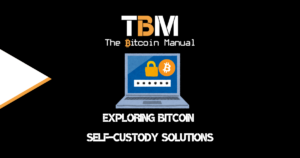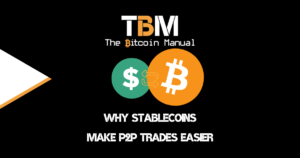Decentralised & P2P Exchanges
Home » Buying Bitcoin » Decentralised & P2P Exchanges
A decentralised exchange is a marketplace built on a blockchain network or leveraging multiple blockchains or sidechains. These platforms typically use the support smart contracts to keep custody of their funds, and every trade incurs a transaction fee along with the trading fee. The trading fee will most likely be a combination of the platforms fee and mining fees as DEX’s deals with on-chain final settlement transactions.
Traders can place orders with individuals, but instead of finding orders that match, they interact with smart contracts on the blockchain to use DEXs. There are three main types of decentralised exchanges: Automated market makers, Order books DEXs and DEX aggregators.
All of them allow users to trade directly with each other through their smart contracts. The first decentralised exchanges used the same order books, similar to centralised exchanges, and as popularity increased for these services, so did feature sets.

How do DEX's work?
Unlike centralised exchanges, DEXs only works with assets native to a blockchain and don’t allow for interactions between fiat and bitcoin — instead; they exclusively trade stablecoins or tokens for bitcoin. A DEX leverages the ability of smart contracts to settle transactions, so there is no intermediary to manage transactions.
Funds are locked into smart contracts and are only released when specific conditions are met, such as the price matching the buyer and seller agreed terms. Once requirements are met, the smart contract executes and the assets in question change ownership.
What is a P2P bitcoin exchange?
P2P Bitcoin exchanges allow users to buy or sell directly with another user. Unlike centralised exchanges where you have to complete KYC to process an order, most P2P exchanges allow you to send and receive bitcoin without asking you for identity verification.
Think of it as a marketplace where individuals can meet up and trade currencies with one another. A P2P market could be done in person with a meetup and you could trade your cash for Bitcoin or it can be done online through various platforms.
Also, exchanges based on the P2P model have no single point of failure like centralised exchanges do.
How do P2P exchanges work?
A user can usually register with the exchange via a website or app without identity verification. Registration simply requires an email address and a password. After registering, a user can go through different buy and sell offers posted by individuals on the platform.
Each offer has different payment options, a different rate and usually a minimum or maximum purchase amount. A buyer can select an offer and contact the seller to set up a transaction. If you’re a seller, you can post the accepted payment method and any fee involved.
Generally, P2P bitcoin exchanges use an escrow account or a multi-sig address to deposit bitcoin or other collateral from the users to ensure the platform’s safety.
Why you would use a DEX?
Trading on decentralised exchanges can be expensive, especially if mining transaction fees are high when the trades are executed. Nevertheless, there are numerous advantages of using DEX platforms.
Anonymity
When users exchange one cryptocurrency for another, their anonymity is preserved on DEXs. In contrast to centralised exchanges, users do not need to go through a standard identification process known as Know Your Customer (KYC). KYC processes involve collecting traders’ personal information, including their full legal name and a photograph of their government-issued identification document. As a result, DEXs attract many people who do not wish to be anonymous.
Reduced security risks
Experienced bitcoin users who custody their funds are at a reduced risk of being hacked using DEXs, as these exchanges do not control their funds. Instead, traders guard their funds and only interact with the exchange when they wish to do so. If the platform gets hacked, only liquidity providers may be at risk.
Reduced counterparty risk
Since decentralised exchanges operate without intermediaries and are based on smart contracts and multi-sig wallets, counterparties solvency risk is eliminated. You now don’t have to trust the liquidity of the exchange and their ability to custody assets correctly as everything is settled on-chain or on a second layer confirmation.
Control over your assets
When using a DEX, you never give up control over your assets; when a bid is placed, funds are locked into an escrow using a smart contract. You can remove your funds from the contract at any time. If a transaction is completed, these are all final settlements and cannot be reversed.
Decentralised exchanges & peer 2 peer exchanges
The bitcoin dex and P2P landscape are still pretty small as most of the purchase volume comes from centralised exchanges. As people look to acquire bitcoin in private or have limited access to bitcoin, the landscape will continue to grow. As for now, there are several services you can use today.
| Exchange | Type | URL |
| Agora Desk | P2P | https://agoradesk.com/ |
| Bisq | DEX | https://bisq.network/ |
| BitMatrix | DEX | https://beta.bitmatrix.app/ |
| BitQuick | P2P | https://bitquick.co/ |
| HodlHodl | P2P | https://hodlhodl.com/ |
| LocalBitcoins | P2P | https://localbitcoins.com/ |
| Noones | P2P | https://noones.com/ |
| Paxful | P2P | https://paxful.com/ |
| Peach Bitcoin | P2P | http://www.peachbitcoin.com/ |
| RoboSats | P2P | https://github.com/Reckless-Satoshi/robosats |
| tbdex | DEX | https://tbdex.io/ |
| Vexl | P2P | https://vexl.it/ |
| xdex | DEX | https://xdex.ch/ |
Share with a friend
If you thought this information was helpful why not share it on your favourite social media network and encourage others to learn more about Bitcoin
The latest news from our blog

What Is Simplicity?
One of the criticisms often levelled at Bitcoin is its limited scripting capabilities, which restrict the complexity of smart contracts. If you ever speak to

Exploring Bitcoin Self-Custody Solutions
The concept of self-custody is at the heart of Bitcoin’s philosophy. Not your keys, not your coins. By owning your private keys, you take complete

Why Stablecoins Make P2P Trades Easier
Acquiring Bitcoin through peer-to-peer (P2P) trading was the default method of acquiring the asset if you didn’t have your own mining set up back in
